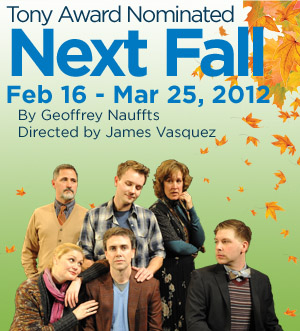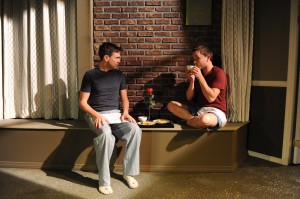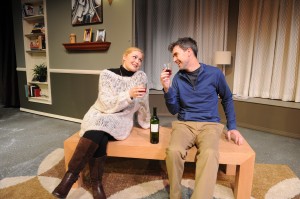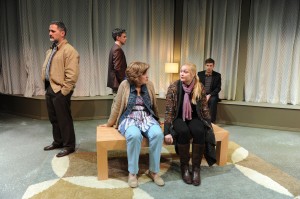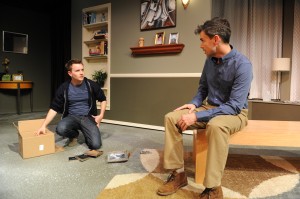IT’S THE SCRIPT THAT TAKES A FALL
The main thing missing from Next Fall, Geoffrey Nauffts’ play about a gay couple with disparate religious beliefs, is credibility. No matter how much the playwright attempts to tackle some very serious modern issues – religion, gay rights, family values – it is difficult to take the play seriously.
Loveable gay Christian Luke (Stewart Calhoun) lies in a coma at a Jewish hospital after an accident. His divorced parents, tough-talking conservative Southerner Butch (John Whitley) and eccentric Arlene (Shana Wride) await any updates on their son in the hospital waiting room. Luke’s lover, the hyper-neurotic atheist Adam (Matt McGrath) bursts in. Because their relationship is a secret to mom and dad, Adam must deal with the unsettling news that visitation is for family only. A series of flashbacks explains how we arrived at the hospital.
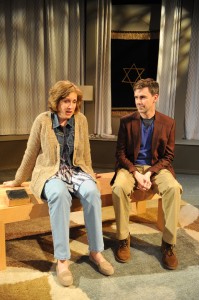 It is these four characters that form the thrust of the play which misses the opportunity for true drama. While Nauffts’ commendable construction contains some funny dialogue, the one-liners and wisecracks fly at the expense of character authenticity. At times, it seems impossible to pinpoint what is wrong on stage, but we know something is not ringing true and that the tear-jerker set-up of an ending has no impact whatsoever. Why is the normally vocal Adam so silent when the love of his life lies dying in the next room? Why are Butch and Arlene so lacking in anguish? And what’s up with the other two archetypal characters who sit in the waiting room? Adam’s fag-hag employer and friend Holly (Jacque Wilke) is neither used to fuel the tension nor dissipate it, so is she just comic relief? And a closeted gay fundamentalist, the bland and smug Brandon (Tony Houck) may be a friend of Luke, but there isn’t a single reason why this character is in the play at all. Why is there a dearth of emotion from the players? Whose fault is it? Is it the playwright? The director? The actors? These are not the questions a spectator should have while watching a play and wondering why the actors are not more impacted by the situation.
It is these four characters that form the thrust of the play which misses the opportunity for true drama. While Nauffts’ commendable construction contains some funny dialogue, the one-liners and wisecracks fly at the expense of character authenticity. At times, it seems impossible to pinpoint what is wrong on stage, but we know something is not ringing true and that the tear-jerker set-up of an ending has no impact whatsoever. Why is the normally vocal Adam so silent when the love of his life lies dying in the next room? Why are Butch and Arlene so lacking in anguish? And what’s up with the other two archetypal characters who sit in the waiting room? Adam’s fag-hag employer and friend Holly (Jacque Wilke) is neither used to fuel the tension nor dissipate it, so is she just comic relief? And a closeted gay fundamentalist, the bland and smug Brandon (Tony Houck) may be a friend of Luke, but there isn’t a single reason why this character is in the play at all. Why is there a dearth of emotion from the players? Whose fault is it? Is it the playwright? The director? The actors? These are not the questions a spectator should have while watching a play and wondering why the actors are not more impacted by the situation.
Matt McGrath is a terrific actor and does some wonderful work as Adam, the whiny, anxious candle-seller/writer who challenges his younger lover’s conflicted religious beliefs, but some of his reactions at the hospital leave us wondering why he is not more grief-stricken over his lover’s crisis. Stewart Calhoun has a good range as Luke, the naïve, playful and confident suitor who truly loves Adam.
John Whitley’s performance as Butch may be accurate in portraying a stern, unlikable conservative who grew up in the South, but it’s an emotionally disconnected, surface performance that makes the mostly one-note character seem villainous instead of well rounded. It doesn’t help when the playwright offers little in the way of inner conflict, going so far as to name the butch character Butch, just in case we didn’t get that it’s a macho character. (The same applies to the ridiculously obvious names of Luke, an apostle, and Adam, [Luke’s] first man).
Shana Wride is inspired as the caretaker Arlene, a loopy hippy mom who is as filled with regret as she is with love for her son. The scene in which Adam tells her about his relationship with Luke (without really telling her) is a highlight of the play. Even though the script dictates that she is more wrapped up in her ex towards the end of the play, both her grief and distress about Luke were also oddly downplayed.
Matt Scott’s set can be confusing: there is a flat wooden backless bench which remains in the same position throughout the show, serving triple-duty as hospital waiting room furniture, a park bench, and the couple’s extremely uncomfortable-looking couch; all the while, an omnipresent curtained back wall was used in the hospital, roof top and park scenes; besides the bench and curtain, there were sometimes few visual cues to connote a change of place.
Director James Vasquez either thought the play could speak for itself or decided not to play up the darker nature of this implausible, simplistic and superficial script. His actors, for all of their character development, lacked the layers and motivation necessary for impactful storytelling, even as they mined several genuine laughs. This play needs more than a light, comedic touch. It needs pathos and poignancy, too.
Next Fall is a mediocre script at best, the patchiness occasionally hidden by some truly funny laugh lines. The premise and the subject matter are truly a boost to the conversation about gay rights, but the script is a setback for American Theater.
photos by Ken Jacques
Next Fall
Diversionary Theatre
4545 Park Boulevard in San Diego
ends on March 25, 2012
for tickets, visit Diversionary
